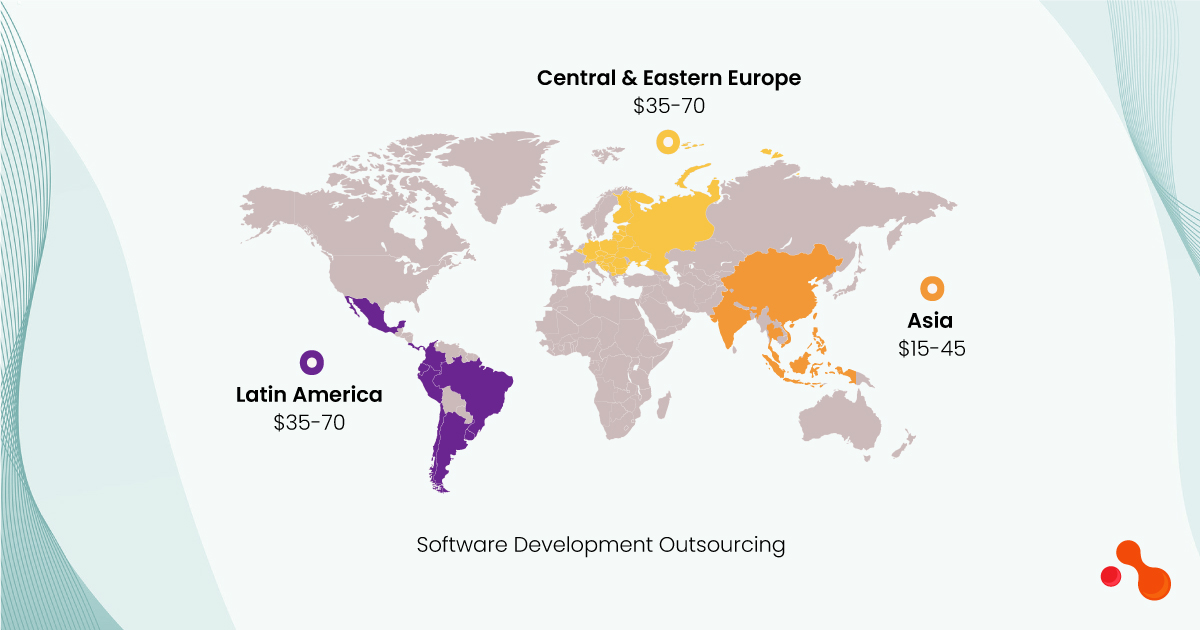
Introduction
Outsourcing is like hiring a superhero team for your software needs. Imagine getting experts from around the world to build your dream app or program! In this guide, we’ll explore Software Development Outsourcing, where companies hire skilled professionals globally. It’s a hot trend because it saves time and money. But beware, choosing the right outsourcing destination is crucial for success.
Overview of Software Development Outsourcing in India
Historical Context and Early Adoption
- India’s journey in software development outsourcing began in the 1980s.
- Early adoption driven by a skilled English-speaking workforce and cost advantages.
India Dominance in the Global Outsourcing Market
- India is a global outsourcing powerhouse, holding a significant market share.
- A vast pool of talented professionals contributing to India’s dominance.
Key Strengths of India in Software Development Outsourcing
- Abundant pool of highly skilled and English-proficient developers.
- Cost-effectiveness without compromising on quality.
Latin America as an Emerging Outsourcing Hub
Rising Prominence in Outsourcing
- Growing recognition of Latin America in global outsourcing circles.
- Increasing preference for hiring remote developers from the region.
Comparative Advantages and Challenges
- Advantages:
- Similar time zones facilitate real-time collaboration.
- Cultural affinity and language proficiency contribute to smoother communication.
- Cost-effective solutions without compromising on quality.
- Challenges:
- Varying economic conditions across countries.
- Limited pool of specialized skills compared to larger outsourcing markets.
Specific Countries Making Strides
- Brazil:
- Booming tech ecosystem and skilled developers.
- Favorable business environment attracting global companies.
- Mexico:
- Proximity to the U.S. market.
- Growing tech talent pool and government support.
- Argentina:
- Strong emphasis on education and IT training.
- Competitive rates and high-quality output.
In Latin America, hiring remote developers offers a promising blend of proximity, cultural alignment, and cost-effectiveness for businesses globally.
Europe’s Role in Software Development Outsourcing
Diversity of Outsourcing Options
- Varied outsourcing opportunities across European countries
- Access to a pool of skilled developers with diverse expertise
Advantages and Considerations
- Proximity to Western markets facilitates real-time collaboration
- High-quality work and adherence to international standards
- Cultural compatibility enhancing communication and project understanding
Notable European Outsourcing Destinations and Strengths
- Skilled workforce, expertise in fintech and software development
- Competitive pricing, focus on software engineering
In Europe, hiring remote developers offers diverse options with proximity advantages and specific country strengths for tailored outsourcing solutions.
Cost Factors and Economic Considerations
Labor Costs Comparison:
- India: Cost-effective hiring with lower hourly rates for developers.
- Latin America: Moderate labor costs, providing a balance between quality and affordability.
- Europe: Higher hourly rates but often associated with top-notch expertise.
Influential Economic Factors:
- Exchange Rates: Impact on overall project expenses.
- Inflation Rates: Consideration for long-term budgeting.
- Tax Incentives: Availability of tax benefits for hiring remote developers.
Balancing Act:
- Prioritize Quality: While cost matters, ensuring high-quality output is crucial.
- Transparent Contracts: Clearly defined terms to avoid unexpected financial implications.
- Evaluate Expertise: Consider the skills and experience offered by developers in relation to costs.
Choose wisely when deciding to hire developers or remote developers to strike the right balance between cost-effectiveness and software development quality.
Cultural and Communication Dynamics
Cultural Alignment in Outsourcing
- Importance: Ensure smooth collaboration when you hire developers remotely.
- Key Points:
- Understanding cultural nuances minimizes misunderstandings.
- Shared values enhance team cohesion.
Communication Challenges and Strategies in Cross-Cultural Outsourcing
- Challenges:
- Language barriers and time zone differences impact communication.
- Strategies:
- Embrace communication tools for real-time interaction.
- Regularly scheduled updates bridge time zone gaps.
Building Effective Teams Across Diverse Geographical Locations
- Importance: Facilitates successful outcomes when you hire remote developers.
- Strategies:
- Foster a virtual team culture through team-building activities.
- Leverage collaborative platforms for seamless project management.
Legal and Regulatory Considerations
Legal Frameworks:
- India:
- Governed by the Indian Contract Act and the IT Act.
- Contracts must comply with Indian laws.
- Latin America:
- Varied legal frameworks across countries.
- Research local laws for each outsourcing destination.
- Europe:
- Diverse legal systems; consider the country-specific regulations.
- GDPR compliance is crucial.
Data Protection and Privacy:
- India:
- Adheres to the Information Technology (Reasonable Security Practices and Procedures and Sensitive Personal Data or Information) Rules, 2011.
- Latin America:
- GDPR-like laws in some countries.
- Evaluate data protection laws in the chosen country.
- Europe:
- GDPR (General Data Protection Regulation) is a key factor.
- Stringent data protection measures.
Intellectual Property:
- India:
- Clear understanding of ownership rights in contracts.
- Protection under the Indian Copyright Act.
- Latin America:
- Ensure clarity on intellectual property rights.
- Contractual agreements for IP protection.
- Europe:
- Robust IP protection laws.
- Clearly define IP ownership in contracts for smooth collaboration.
Future Trends and Predictions
Emerging Trends in Global Software Development
- Increased adoption of remote and distributed teams
- Growing importance of AI and automation in software development processes
- Rise of niche outsourcing services for specialized tasks
Predictions for the Evolution of Outsourcing Dynamics
- India sustaining its dominance, with a focus on high-value services
- Latin America witnessing a surge in demand due to cultural proximity
- Europe becoming a hub for complex and innovation-driven projects
Recommendations for Businesses
- Prioritize cultural fit and communication when selecting outsourcing partners
- Stay abreast of legal and regulatory changes in chosen outsourcing destinations
- Embrace flexibility and adaptability to leverage emerging technologies effectively.
Conclusion
In a nutshell, we’ve explored the diverse landscapes of software development outsourcing. India excels with its established prowess, while Latin America emerges as a vibrant contender. Europe, with its varied options, adds another dimension. For businesses seeking the right outsourcing destination, balance cost considerations with cultural alignment. The future promises dynamic shifts, urging companies to stay agile and choose partners wisely.





